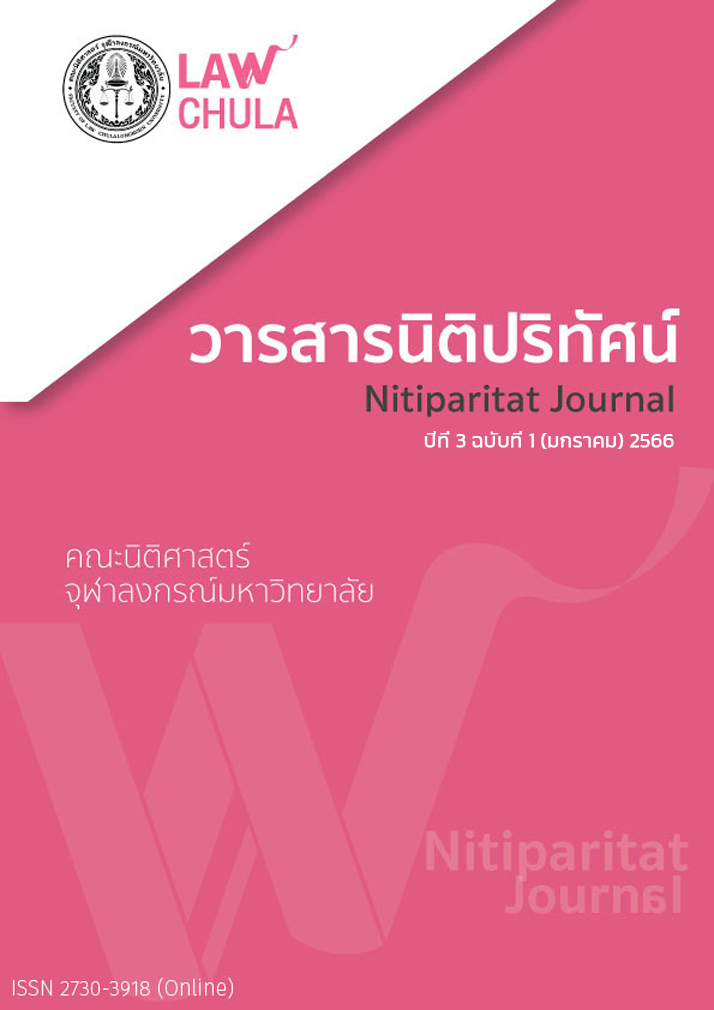ทฤษฎีปัญหาทางการเมืองกับการแบ่งเขตเลือกตั้ง: การปฏิเสธในการตรวจสอบการแบ่งเขตเลือกตั้งของศาลสูงสุดสหรัฐอเมริกา
บทคัดย่อ
การตรวจสอบการแบ่งเขตเลือกตั้งนั้นเป็นความท้าทายของฝ่ายตุลาการเสมอมา เนื่องจากการแบ่งเขตเลือกตั้งนั้นมีผลกระทบต่อประโยชน์ทางการเมืองของพรรคการเมืองอย่างมหาศาล ศาลจึงต้องใช้ความระมัดระวังอย่างยิ่งในการที่จะเข้าไปตรวจสอบและควบคุมการแบ่งเขตเลือกตั้ง ในสหรัฐอเมริกา ศาลได้มีการพัฒนาและปรับใช้ทฤษฎีปัญหาทางการเมืองขึ้นเพื่อกำกับการตรวจสอบการแบ่งเขตเลือกตั้ง อย่างไรก็ตาม การปรับใช้ทฤษฎีดังกล่าวยังมีข้อจำกัดอยู่มาก โดยเฉพาะอย่างยิ่งเมื่อศาลเลือกปรับใช้เพื่อให้สอดคล้องกับคุณค่าต่าง ๆ บทความนี้มุ่งศึกษาการปรับใช้ทฤษฎีปัญหาทางการเมืองของศาลสูงสุดสหรัฐอเมริกา และวิเคราะห์ว่ามีข้อจำกัดอย่างไรในการตัดสินพิจารณาคดี ทั้งในมิติของความชอบด้วยกฎหมายและความชอบธรรม
เอกสารอ้างอิง
เกรียงไกร เจริญธนาวัฒน์, หลักพื้นฐานกฎหมายมหาชน, พิมพ์ครั้งที่ 6 (กรุงเทพฯ: วิญญูชน, 2563), หน้า 104-117
ธำรงศักดิ์ หงษ์ขุนทด, “บทบาทของฝ่ายตุลาการในประเทศไทย,” (นิติศาสตรมหาบัณฑิต บัณฑิตวิทยาลัย จุฬาลงกรณ์มหาวิทยาลัย, 2527), หน้า 37.
แม้ก่อนหน้านี้จะยังมีข้อความคิดในเรื่องการตรวจสอบการกระทำขององค์กรของรัฐในคดีต่าง ๆ บ้าง แต่ยังมีลักษณะเป็น “ข้อยกเว้น” ที่ศาลพึงใช้ในกรณีที่จำเป็นและเร่งด่วนเท่านั้น โปรดดู ฟารีส อินาวัง, “ปัญหาการวินิจฉัยข้อพิพาททางการเมืองโดยศาลรัฐธรรมนูญไทย,” (นิติศาสตรมหาบัณฑิต สาขากฎหมายมหาชน คณะนิติศาสตร์ มหาวิทยาลัยธรรมศาสตร์, 2559), หน้า 31.
เรื่องเดียวกัน, หน้า 32
จักรกฤษณ์ สถาปนศิริ, “หลักปัญหาทางการเมืองของสหรัฐอเมริกา,” วารสารนิติศาสตร์ มหาวิทยาลัยนเรศวร 4 (2554): 23.
Luther v. Borden, 48 U.S. (7 How.) 1 (1849)
Terlinden v. Ames, 184 U.S. 270 (1902)
Commercial Trust Co. v. Miller, 262 U.S. 51 (1923)
เกรียงไกร เจริญธนาวัฒน์ และคณะ, “การกระทำทางรัฐบาล: ศึกษากรณีเปรียบเทียบระหว่างประเทศไทย สาธารณรัฐฝรั่งเศส สหพันธ์สาธารณรัฐเยอรมนี สหรัฐอเมริกา และอังกฤษ” (งานวิจัยเสนอสำนักงานศาลรัฐธรรมนูญ, 2554), หน้า 119.
ระยะก่อนหน้าอาจมีการพัฒนาหลักการในเรื่องปัญหาทางการเมืองบ้าง แต่สำหรับคดี Baker นี้ เป็นครั้งแรกที่ศาลได้มีการกำหนดหลักเกณฑ์ทางกฎหมาย (legal test) มากำหนดและปรับใช้อย่างชัดเจนว่าสิ่งใดเป็นหรือไม่เป็นปัญหาทางการเมือง
‘Political Questions, Public Rights, and Sovereign Immunity’ [Online]. 2016. Available from: https://harvardlawreview.org/2016/12/political-questions-public-rights-and-sovereign-immunity/ [2022, December 25]
ในทางตำรากฎหมายรัฐธรรมนูญในสหรัฐอเมริกาจะเรียกปัจจัยต่าง ๆ ข้างต้นว่า “ปัจจัย Baker” (Baker factors)
Baker v. Carr, 369 U.S. 186 (1962)
Baker v. Carr, 369 U.S. 186, 217 (1962) (“[The political question doctrine is] essentially a function of the separation of powers.”).
Baker v. Carr, 369 U.S. 186, xxx (1962) (“The political question doctrine, a tool for maintenance of governmental order, will not be so applied as to promote only disorder.”).
เกรียงไกร เจริญธนาวัฒน์ และคณะ, “การกระทำทางรัฐบาล: ศึกษากรณีเปรียบเทียบระหว่างประเทศไทย สาธารณรัฐฝรั่งเศส สหพันธ์สาธารณรัฐเยอรมนี สหรัฐอเมริกา และอังกฤษ,” หน้า 120.
Nixon v. United States, 506 U.S. 224 (1993)
Goldwater v. Carter, 444 U.S. 996 (1979)
เหตุที่ใช้คำว่า “นิติบัญญัติ” (the Legislature) มิใช่ “ฝ่ายนิติบัญญัติ” (state Legislature) เนื่องจากศาลสูงสุดแห่งสหรัฐอเมริกาได้มีการตีความคำว่านิติบัญญัติว่าอาจหมายรวมถึงฝ่ายอื่น ๆ ที่มิใช่ฝ่ายนิติบัญญัติ แต่ได้ใช้อำนาจนิติบัญญัติตามกรอบของรัฐธรรมนูญแห่งรัฐนั้น ๆ ได้ด้วย (ดูคดี Smiley v. Holm, 285 U.S. 355 (1932) และคดี Arizona State Legislature v. Arizona Independent Redistricting Commission, 576 U.S. 787 (2015))
U.S. Const. Art. I, §4, cl. 1.
J. Peter Mulhern, ‘In Defense of the Political Question Doctrine’ (1988) University of Pennsylvania Law Review 137, 176.
U.S. Const. Amend. XIV, §1.
รวินท์ ลีละพัฒนะ, มุมมองใหม่ต่อการกระทำทางรัฐบาลในประเทศไทย: ศึกษาผ่านประวัติศาสตร์กฎหมายรัฐธรรมนูญ, พิมพ์ครั้งที่ 1 (กรุงเทพฯ: สถาบันพระปกเกล้า, 2565), หน้า 16
เช่น ปัญหาว่าการแบ่งเขตเลือกตั้งสามารถที่จะกระทำโดยคณะกรรมการอิสระ มิใช่สภานิติบัญญัติได้หรือไม่ (คดี Arizona State Legislature v. Arizona Independent Redistricting Commission, 576 U.S. 787 (2015)) ซึ่งเป็นปัญหาในเชิงกระบวนการ ไม่ใช่เชิงเนื้อหา เป็นต้น
Rucho v. Common Cause, No. 18-422, 588 U.S. ___ (2019)
ศาลได้ให้เหตุผลทางกฎหมายอื่น ๆ ประกอบด้วย เช่น การพิจารณาตามปัจจัย Baker หรือประเด็นในเรื่องเขตอำนาจของศาลสหพันธรัฐ ซึ่งจะไม่ขอยกมาอธิบาย ณ ที่นี้
Rucho v. Common Cause, No. 18-422, 588 U.S. ___ (2019) (majority opinion, part V)
เป็นที่น่าสังเกตว่า ศาลปฏิเสธที่จะเข้าไปตรวจสอบถึงความชอบด้วยรัฐธรรมนูญของการแบ่งเขตเลือกตั้ง ทั้ง ๆ ที่การแบ่งเขตเลือกตั้งดังกล่าวนั้น เห็นได้อย่างชัดเจนว่าเป็นการแบ่งเขตเลือกตั้งเพื่อเอื้อประโยชน์ให้กับพรรคการเมืองอย่างสุดขั้ว (extreme)
J.A. Myers. ‘Transatlantic Perspectives on the Political Question Doctrine’ (2020) Virginia Law Review 106(4), 1016.
Colegrove v. Green, 328 U.S. 549 (1946)
Baker v. Carr, 369 U.S. 186 (1962) (“there should be no dismissal for nonjusticiability on the ground of a political question's presence. The doctrine of which we treat is one of "political questions," not one of "political cases”)
Herbert Wechsler. ‘Toward Neutral Principles of Constitutional Law’ (1959) Harvard Law Review 73, 1–35.
Davis v. Bandemer, 478 U.S. 109 (1986) (The greater warrant the Equal Protection Clause gives the federal courts to intervene for protection against racial discrimination, suffice to render racial gerrymandering claims justiciable.) (O’Connor, concurring)
Mary L. Volcansek, ‘Judicialization of Politics or Politicization of the Courts in New Democracies?’ in Christine Landfried (ed) (2019), Judicial Power: How Constitutional Courts Affect Political Transformations (Cambridge University Press), 66-81
ดาวน์โหลด
เผยแพร่แล้ว
รูปแบบการอ้างอิง
ฉบับ
ประเภทบทความ
สัญญาอนุญาต
ลิขสิทธิ์ (c) 2023 ธันยธรณ์ โรจน์มหามงคล

อนุญาตภายใต้เงื่อนไข Creative Commons Attribution-NonCommercial-NoDerivatives 4.0 International License.
บทความที่เสนอเพื่อพิจารณาการตีพิมพ์ต้องไม่มีลักษณะคัดลอกผลงานวิชาการและต้องไม่มีเนื้อหาที่ละเมิดลิขสิทธิ์



